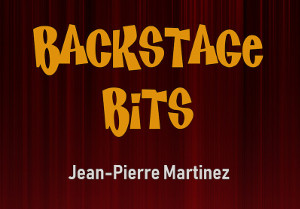A sketch by Jean-Pierre Martinez
Two characters (men or women) are there, seemingly waiting. They remain silent for a moment.
One – Bloody hell, it’s dragging on.
Two – Yeah.
One – How long have we been waiting?
Two – No idea. They told us to be on set for eight… (checks watch) It’s eleven.
One – Three hours! And we haven’t even done a single take.
Two – You’d think three hours would be enough time to get ready.
One – Or they could just have told us to come at noon.
Two – Filmmaking would be a lovely job if it weren’t for the crew…
One – Maybe we should go and ask what’s going on…
Two – Honestly, I wouldn’t.
One – True, they’re ridiculously touchy. You can’t say anything without it sounding like some diva tantrum from a spoiled actor.
Two – So we just have to shut up and wait.
One – Still, at the end of the day, we’re the ones people see on screen.
Two – I sometimes wonder if that’s what they’re punishing us for – waking us up at dawn just to leave us hanging around in a draughty corridor for hours while they get on with their work.
One – If only we could actually see them.
Two – Yeah, it’s been ages since they showed their faces. I wonder what they’re even doing.
One – Probably having a snack. You know, workers start early, so by eleven they’re starving…
Two – They say actors are complicated, but truth is, actors spend far more time waiting for the crew than the other way round.
A pause.
One – Actually, I’m getting seriously hungry, aren’t you?
Two – Yeah…
One – There’s food on the table over there. Surely it’s not just for the crew?
Two – No, but… it’s all cold meats and cheese.
One – So?
Two – I’m vegan.
One – Oh, bugger…
Two – Yep… The crew chooses the menu too. And workers eat cold meats.
A pause.
One – Can I ask you something?
Two – You see, this is what I dread most about standing around on set for hours before the director finally decides to call “action”…
One – What?
Two – It always ends with existential questions.
One – Sorry…
Two – Go on, ask your question.
One – When you play a role, do you actually become the character in your head, or do you just say the lines and pose while thinking about what you’ll have for lunch?
Two – OK, so… Stanislavski or Brecht, is that it?
One – Um… yeah, if you like…
Two – I’m more of a Diderot type, you know.
One – Diderot?
Two – The Paradox of the Actor, haven’t you read it?
One – No.
Two – According to Diderot, an actor shouldn’t identify with the character they’re playing. Their job isn’t to feel the emotions, but to make the audience feel them.
One – Right…
Two – So if you’re playing anger, you don’t need to be angry. You just convincingly replicate the signs of anger.
One – Got it.
Two – Basically the opposite of the Method, or Actors Studio, if you prefer.
One – I see.
Two – Do you, though?
One – Yeah, yeah, it’s… it’s clear.
Two – You know that scene in Taxi Driver, when De Niro’s practising being tough in front of the mirror?
One – You talkin’ to me?
Two – Well, in that scene, De Niro – or rather his character – is trying to imitate anger, to look tough for an imaginary threat.
One – But De Niro trained at the Actors Studio, didn’t he?
Two – He did, but in that particular scene, De Niro is playing a character who is himself trying – badly – to act. It’s a kind of mise en abyme. When he’s playing the taxi driver, he uses the Method. But when the character tries to play a hard man, he’s copying a cliché of what a hard man looks like.
One – And that’s not a bad thing?
Two – Not if it’s done with intention. But if it’s just laughably over the top, yes. Still, you can absolutely act angry without being angry. It’s often more convincing. And it’s definitely less exhausting in the long run.
One – That’s true…
Two – And you? Are you more Method, or more Diderot?
One – Me, I’m completely into the role. I am the character, you know? I don’t act the part — I am the part.
Two – Right…
One – You don’t think that’s the right approach?
Two – No, no, I mean… why not. But… it does worry me a little. Since in the scene we’re about to film together, you’re playing a violent copper and I’m the poor sod he’s interrogating…
One – Ah, I think it’s our turn now.
Two – Well… maybe just try to keep a bit of distance from your character, yeah? (The other, already deep into the role, doesn’t seem to hear.) Are you listening to me?
One – You talkin’ to me?
Blackout.
All the texts available on this website can be downloaded for free. However, performance rights, which constitute fair compensation for the author’s work, are a legal obligation. Whether you are an amateur or a professional, you must request authorization to perform the play and pay the corresponding royalties for the production.
To get in touch with Jean-Pierre Martinez and ask an authorization to represent one of his works: CONTACT FORM.
A sketch from the collection Backstage Bits
Link to the collection for free download (PDF)

Find all of Jean-Pierre Martinez’s plays on his website:
https://jeanpierremartinez.net
